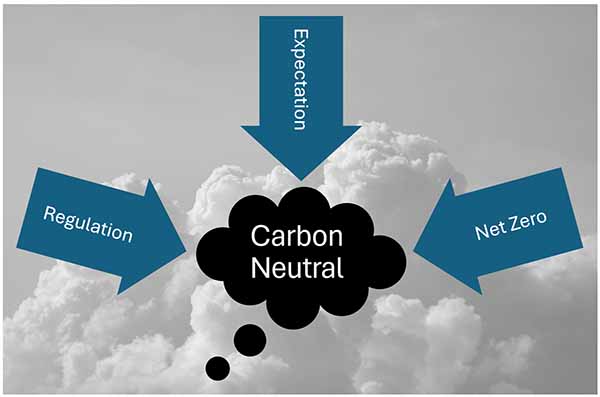Are neutrality claims viable in an increasingly hostile environment?
While many large companies now appear wary of making claims about carbon neutrality, we can still see considerable focus on these in the SME space, some fuelled by questionable labelling schemes.
Despite considerable regulatory focus on carbon neutral claims, companies are still getting their communications wrong – so what is happening?
This article reviews recent regulatory and best practice developments and explores where businesses have gone wrong.

Regulatory activity on carbon neutral communications
What are the regulators’ current positions in this changing landscape?
In the UK the ASA and CMA are working closely with each other on this agenda. However, in general, more information is forthcoming from the ASA.
There has been quite a lot of activity in this area, in September 2021 the ASA stated that they were:
‘signalling that we intend to go further, to crack down on misleading and socially irresponsible environmental advertising and to do so in the context framed by Government and key priorities identified by experts’.
At the same time the ASA and CAP (Committee of Advertising Practice) launched their Climate Change and the Environment (CCE) project:
‘to respond to the ongoing climate crisis and take action to ensure that environmental claims in advertising are not misleading or irresponsible.’
These set out a public intent to act. The following year the ASA conducted research into consumer understanding around the use of carbon-related terms.
Perhaps unsurprisingly, this revealed a general lack of public understanding around the meaning of terms such as carbon neutral, net zero and climate neutral and a desire for simplification and standardisation.
However, more importantly, the study revealed a widespread lack of understanding on the definition of carbon neutral. Carbon neutral generally applies at a product, service or organisation level, and refers to the balancing of carbon emissions with equivalent carbon reductions and the purchase of carbon offsets.
The ASA study found that people often believed that carbon neutral meant that an absolute reduction in carbon emissions was being claimed – either now or in the future. Because in common practice carbon neutrality tends to rely heavily on carbon offsets, the ASA believed there is a significant likelihood of consumers being misled.
As a result, Advertising Guidance on The environment: misleading claims and social responsibility in advertising was published by the CAP in 2023 to reflect this problem with consumer perception and to align with the CMA’s (Competition and Markets Authority) Green Claims Code.
However, the CAP is still gathering information and has committed to a further review of relevant domestic and overseas policy developments and expert insights. It intends to use this information to provide potential further guidance on the use of evidence to substantiate claims.
Carbon neutral communications – a balancing act
The regulators have a difficult balancing act to maintain. To some extent, scientific and public opinion has turned against the concept of carbon neutrality. Climate scientists are clear that dramatic reductions in carbon emissions are needed. Against this background, numerous studies and reports have lifted the lid of carbon offsetting schemes and shown that they often fail to demonstrate real or lasting emissions reductions. This has led to a crisis of confidence and to some extent a backlash against offsetting.
When you have a mismatch between a general consumer’s understanding of carbon neutral schemes and what they can often be proven to deliver, then you have the right ingredients to further fuel mistrust in communications on this topic.
Similar changes are happening in other countries. In February 2024 the European Council adopted a directive on consumer rights for the green transition;
‘The directive will protect consumers against misleading ‘green’ claims, including about unfair claims about carbon offsetting’.
The directive is intended to enhance consumers’ rights by amending the unfair commercial practices directive (UCPD) and the consumer rights directive (CRD).
The updates clamp down on claims making use of offsetting. As a result, the use of terms such as ‘climate neutral’ or ‘climate positive’ which rely on offsetting will be banned from the EU by 2026.
The directive includes wider provisions on greenwashing including the requirements that only sustainability labels using approved certification schemes will be allowable.
Are we seeing changes in behaviours and practices for using ‘carbon neutral’?
Against this background, the Carbon Trust (a widely respected UK non-profit climate consultancy) ditched its Carbon Neutral label in September 2023, and replaced it with four new, more specific labels focusing on carbon reductions – a response clearly designed to meet changing requirements.
But companies are still getting in trouble.
The ASA conducts monitoring of communications, including the use of AI to check compliance and also conducts investigations and acts on complaints.
Two recent rulings are notable.
Getting shirty …
Shirt retailer Charles Tyrwhitt made a claim to be 100% carbon neutral, saying they were: ‘proud to be a Carbon Neutral business’ in a Facebook advert shown in summer 2023.
Charles Tyrwhitt Shirts said that their carbon claims were based on a report conducted in partnership with the sustainability consultancy Planet Mark using PAS2060 guidelines and were factually correct.
The ASA did not appear to question the evidence directly, but ruled that the ad was misleading because it contained no information or link to the evidence.
A storm brewing …
In July 2023, the beer maker BrewDog also fell foul of the rules, this time on Instagram. This included the image of a poster and the text ‘’Positive Planet CERTIFIED CARBON NEGATIVE COMPANY’ and ‘Beer for your Grandchildren. From the World’s First Carbon Negative brewery. Find out how we’re working to ensure we have a planet to enjoy beer on via the link in our bio’.
Complaints were received which claimed that the Ad was misleading because the basis of the claim was unclear.
BrewDog replied that restrictions on Instagram meant they could not include a link to further information, but that they had one in their ‘bio’ which was referred to. They also pointed out that the image of the poster included the Positive Planet certification that they had used to assure their carbon negative credentials.
The ASA replied that:
‘we considered that the ad itself did not include information which explained the basis of the claim. Without that information, we considered that consumers would not have sufficient information to understand the basis of the environmental claims in the ad’.
They also stated that they did not think the Positive Planet carbon negative badge was sufficient basis to make the claim. They also rejected BrewDog’s defence regarding the lack of space or functionality in an Instagram ad – pointing to a caption limit of 2200 characters and ruled that ‘the use of a completely unqualified “carbon negative” claim would be likely to mislead.’
What can we learn about communications on carbon neutrality?
The regulators are quite consistent on what’s needed for carbon related communication, and this no different to the requirements for other types of claim:
- The basis of claims must be (very) clear
- Claims must be based upon evidence and accurate information – this must be on the advert or very close to it
- Claims on carbon reduction and neutrality must detail the balance between actual reductions and offsets
- If claims include future goals for reductions, these must be based upon a verifiable delivery strategy.
This applies for the UK, but as noted above, the regulations in Europe will soon be tighter (and are already in France). So, if you are operating in the UK and EU (and beyond) you face a choice. To pursue different claims approaches in different jurisdictions, or to unify to the tougher requirements.
Most of our customers are taking the latter route, favouring consistency of approach and messaging avoids undue confusion and risks.
It’s also important to consider what’s most authentic. As dramatic real reductions in emissions are ever more vital, it is becoming increasingly harder to argue that offsets by themselves can deliver the meaningful changes required.


Can we help you?
We’ve worked with companies in the UK, Europe and
beyond to avoid greenwashing by developing responsible engagement and communications approaches, content and copy. Ranging from strategic corporate reporting and disclosure to brand guidelines or in-store packs, we can help you develop content that’s clear, accurate and substantiated.
Book a chat with one of our partners to explore how we might help you – there’s no obligation!


 Reputation risk and sustainability – who do you work with?
Reputation risk and sustainability – who do you work with?
Leave a Reply